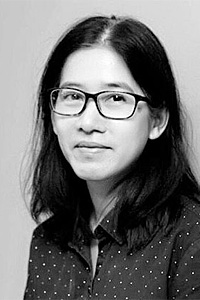
A couple of weeks ago, two well-known monks -- Phra Maha Sompong Talaputto and Phra Maha Praiwan Worawano -- held a livestream talk show on social media that attracted 200,000 viewers. The chat led to several debates between their supporters and opponents since it was different from typical dhamma talks or dhamma preaching. The two monks used several teenage slang expressions and joked with their viewers who commented via the live chat. While Phra Maha Sompong focused on delivering his own jokes like a standup comedian, Phra Maha Praiwan, who knew many teenage expressions, giggled uncontrollably throughout the show. He was criticised for not being not calm or having self-control as a monk should.
Phra Maha Praiwan started livestreaming solo in order to communicate with his followers on Facebook several months ago. Later, Phra Maha Sompong joined his show and it went viral. Using social media and slang to communicate with young followers is a good way to make dhamma more accessible, comprehensible and interesting. However, throughout the two-hour show, neither monk provided much information about dhamma. It was more like a comedy show.
The two monks are known for their criticism of the government. Due to their criticism, Phra Maha Praiwan was warned by the National Office of Buddhism that his political comments were inappropriate. The Committee of the Sangha Supreme Council of Thailand also stated that Phra Maha Sompong's political comments were inappropriate and it was not the duty of a monk to make political comments. I agree that it is not the duty of a monk to get involved in politics and it is not appropriate for monks to participate in protests. However, criticising the government for corruption should not be forbidden. As monks encourage people to do good deeds, pointing out inappropriate or suspicious actions taken by the government should not be against Buddhism.
After the two monks' livestream was brought to the spotlight, I became curious about them and watched their livestreams and talk shows. On several TV shows, Phra Maha Sompong usually delivers jokes more than preach about Buddhism. The most inappropriate show by Phra Maha Praiwan was Phra Maha Praiwan Unboxed, which involved him opening packages to show what was inside and read the names of senders or stores on packages. The show had nothing to do with dhamma. Phra Maha Praiwan often gives thanks to his fan club on YouTube for their offerings and provides free advertisements to stores that send him freebies. When people criticised this inappropriate behaviour, the monks' followers defend them or tell the opposition to mind their own business.
Even though I felt offended by Phra Maha Sompong's jokes and comical exchanges and Phra Maha Praiwan's unreasonable giggling and irrelevant show, I found many of Phra Maha Praiwan solo shows to be interesting, especially when he answered questions from his followers. His answers enabled them to know more about Buddhism from a different perspective.
One video popular among the youth tackles the issue of gratitude. Phra Maha Praiwan provided insight in a thread on the forum Pantip in which one woman asked why she had never gone far in life. The woman said she had supported herself since she was 18. She gave half of her salary to her parents but they always asked her for more money and had never cared about her health or her life. Her question came from the belief in Thai society that gratitude to parents is a good deed and anyone who takes care of their parents will be successful. Many monks also compare parents to an arhat or enlightened Buddhist monk, which means that parents are moral people and children must be grateful to their parents.
Phra Maha Praiwan did not answer the question directly. Instead, he pointed out that not every parent behaves like an arhat or enlightened Buddhist monk. To make children feel grateful, parents should take responsibility for their children. Many followers were satisfied with the monk's comment since most children are taught to treat their parents well but cannot question whether their parents treat them properly or not. Some of the followers even said the video made them more interested in Buddhism.
After the two monks met with the House Committee on Religion, Art and Culture about their livestreams, Phra Maha Sompong said he will tone down the jokes and provide more religious content. In their recent livestream, the two monks taught viewers that they do not have to spend money in order to make merit since making merit includes not just donations but also observing religious precepts and meditation. They also asked viewers to meditate with them for five to seven minutes at the end of the show.
Even though the monks now provide more useful content, their show still contains some inappropriate behaviour. In a country that is full of monks who ask for donations, sell amulets and other sacred charms or give hints to winning lottery numbers, respectable monks are rare to find. One of the show's good points is that it inspired some young people to become more interested in Buddhism but I hope that young people can find more serious teachings from other sources. There are other monks who can preach in an interesting and lively way without inappropriate jokes, nonstop giggling and acting like a YouTuber instead of a monk.
Suwitcha Chaiyong is a feature writer for the Life section of the Bangkok Post.
